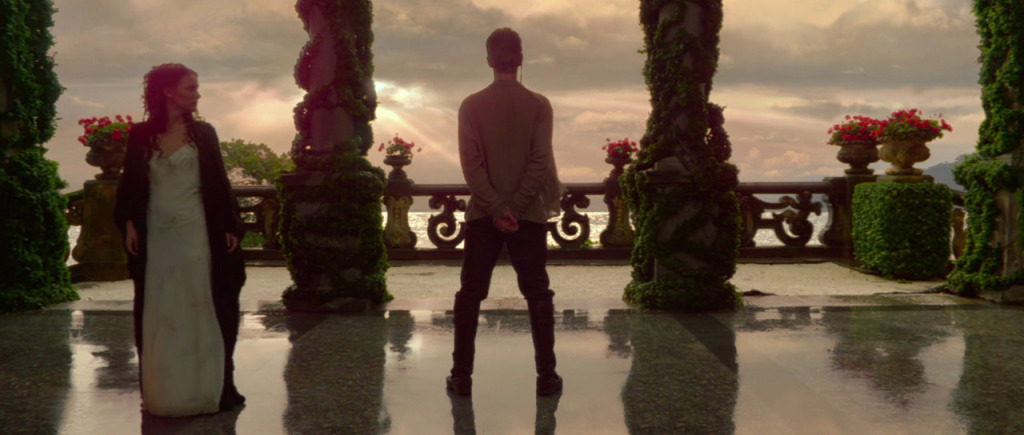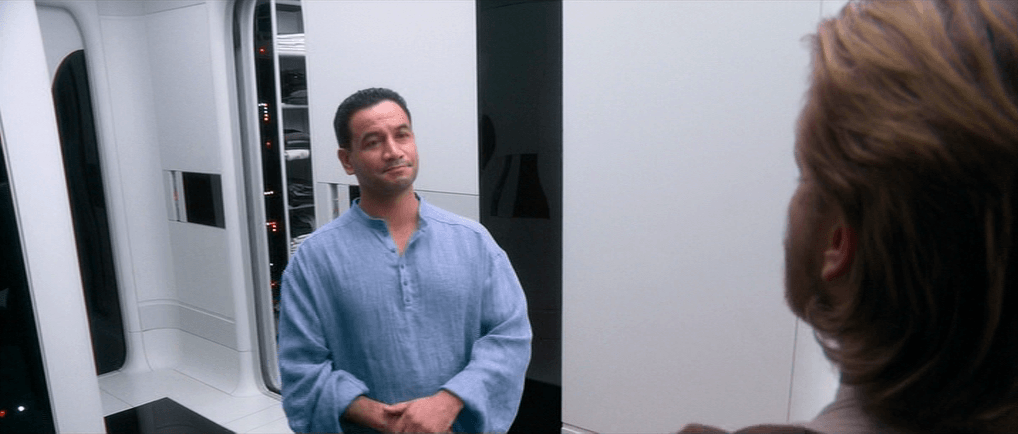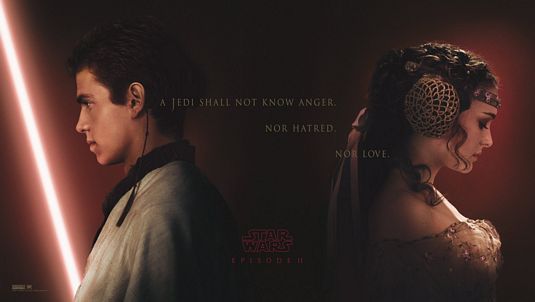Attack of the Clones is probably the oddball of the Star Wars saga. It varies noticeably from other movies in that there are no main villains for most of the movie and that a large portion of the narrative is based on dialogue, but this does allow for another contemplative meditation on “choice”.
We start off where we ended last: Anakin Skywalker. After ten years of living romantically and partially paternally barren, Anakin is rather confused. It’s obvious from the first moment he’s on screen: he can’t believe he’s going to see Padme again and is visibly shaken. After ten years of having a romance-sized hole in his heart Anakin finally feels that Padme will fill it. As soon as he begins to get close to her his emotions are shown to be very turbulent. He says rather strange things at inappropriate times to Padme and begins to rant in casual conversation. Ever so slightly, he begins to forfeit his ability to choose, by becoming more and more controlled by his emotions as the movie continues.
This slowly builds throughout the movie and finally comes to a head on Tatooine when Anakin kills all the Tusken raiders to get revenge on the ones that killed his mother. When he does this he completely relinquishes his ability to make the right decision for that moment and is totally ruled by unbridled malice (a.k.a. the dark side). He allows his anger to get the best of him and allows his malicious emotions to dominate his mind for a time. Afterwards he shows some form of regret, but with the help of Padme (talk about bad decisions) he simply replaces his anger with his love and infatuation (at that point it’s still infatuation in my opinion) for Padme.
 This instance presents us with the idea that we can begin to weaken our resolve to make moral decisions and drives us deeper into impulsiveness, a vicious cycle.
This instance presents us with the idea that we can begin to weaken our resolve to make moral decisions and drives us deeper into impulsiveness, a vicious cycle.
Next, we see Obi-Wan Kenobi in his political escapade which by it’s nature involves an ability to curb or harness one’s emotions. As Obi-Wan begins to track the mysterious assassin to the ends of well-known space. He must gather all his wits and play his cards right to discover all the mystery surrounding Jango Fett. He must make sure he does not show his emotion to Jango or any of the Kaminoans so as not to blow his cover. This is expertly showcased in what some fans have come to refer to it as a verbal duel with Jango. Obi-Wan sees Jango’s incriminating armor and it’s very likely that somebody like Anakin would immediately draw his saber and make his move.
 Obi-Wan, on the other hand, bides his time and waits until he can get Jango alone, and while he still fails to capture Jango he is mostly cut short by fate (or the force), and his failure was ultimately saved by the happenings on Geonosis. One can’t help but notice the almost sharp contrast between Anakin and Obi-Wan. Obi-Wan is very collected and makes decisions based on facts and evidence while Anakin is very impulsive and can base his decisions solely on emotion. We even have this showcased during the scene in which Obi-Wan tells Anakin not to rescue him from his captors on Geonosis, only to alert the council so they can deal with it. In response Anakin makes the impulsive (but still altruistic) decision to rush to his friend’s aid, only to be captured himself; such is the fate of those who don’t think things through.
Obi-Wan, on the other hand, bides his time and waits until he can get Jango alone, and while he still fails to capture Jango he is mostly cut short by fate (or the force), and his failure was ultimately saved by the happenings on Geonosis. One can’t help but notice the almost sharp contrast between Anakin and Obi-Wan. Obi-Wan is very collected and makes decisions based on facts and evidence while Anakin is very impulsive and can base his decisions solely on emotion. We even have this showcased during the scene in which Obi-Wan tells Anakin not to rescue him from his captors on Geonosis, only to alert the council so they can deal with it. In response Anakin makes the impulsive (but still altruistic) decision to rush to his friend’s aid, only to be captured himself; such is the fate of those who don’t think things through.
In conclusion Attack of The Clones is a solemn warning to where allowing blatant impulsiveness and lack of forethought can lead. It shows us that life can be better when we’re in control of our emotions, and make choices deliberately and not impulsively.
Author: Len Cline
Len Cline has been a fan of Star Wars since he saw a pirated “A New Hope” with a TV dinner when he was around 3 (He only remembers the Tantive 4 battle), he was in his “Primary Star Wars Introduction Age” (PSWIA for short) (aka. 7 years) when “Revenge of the Sith” came out. Len fell out of the active Star Wars fandom for a few years and explored the majority of science fiction eras (except for the 90’s , which is a big deal (Except for Star Trek) until he was brought back through the Star Wars podcasting community. Len loves to read science fiction (Asimov being his favourite writer) and also enjoys the classics (Dostoyevsky anyone?). He loves all things philosophy (Cogito ergo sum!), politics (De Toqueville and Machiavelli!), and poetry (Mathew Arnold and T.S. Eliot for the win!). He is also an anglophile. Len’s worldview is colored by many things in his life: He’s a devout Catholic and holds his beliefs high, as well as believing that morality and personal responsibility are paramount. Len hopes to move to Europe to attend college for philosophy and/or other social sciences. He then aims to put his studies to good use for the world (hopefully just like Luke Skywalker!).

